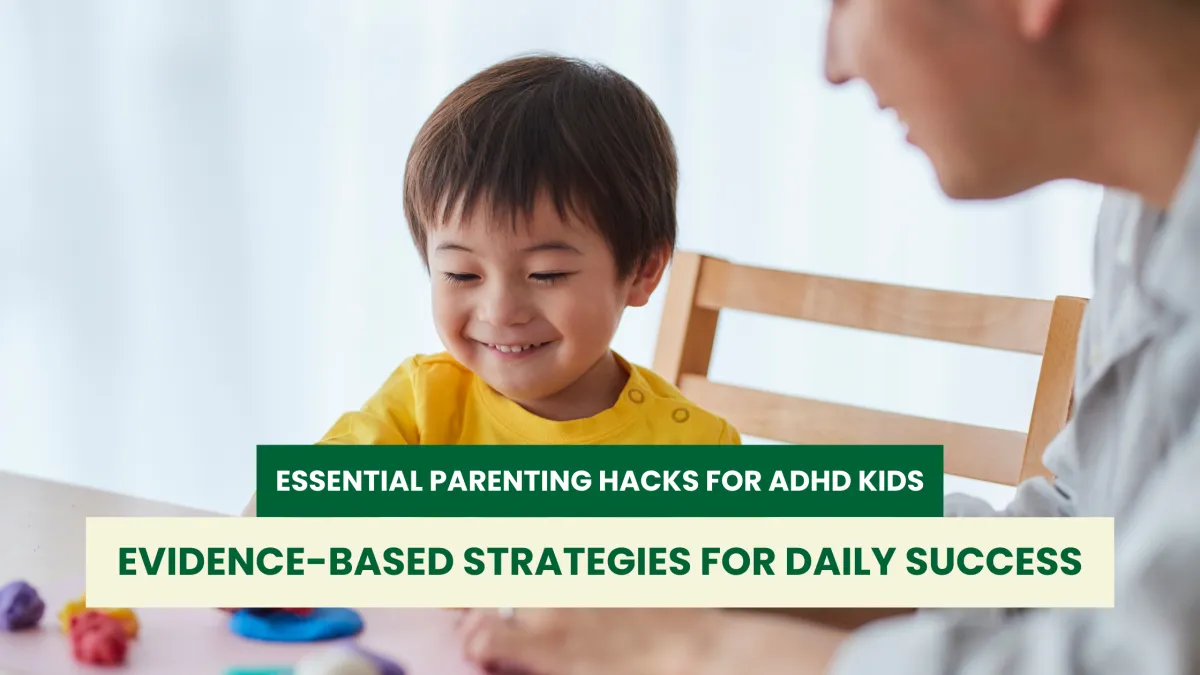
Essential Parenting Hacks for ADHD Kids
As a clinical child psychologist, I've worked with countless families navigating the unique challenges and incredible strengths that come with raising children with ADHD. While every child is different, research has consistently shown that certain approaches can make a significant difference in helping children with ADHD thrive at home and in school. This guide offers practical, evidence-based strategies that parents can implement right away.
Understanding ADHD: The Foundation for Effective Parenting
Attention-Deficit/Hyperactivity Disorder (ADHD) affects approximately 5-9% of children worldwide. It's characterized by difficulties with attention, hyperactivity, and impulsivity that exceed developmental expectations. These challenges aren't due to laziness or poor parenting—they reflect real neurobiological differences in brain development and function.
Research from the Multimodal Treatment Study of ADHD (MTA) and subsequent studies have consistently shown that the most effective approach combines:
Behavioral strategies
Environmental modifications
Consistent routines
Clear communication
Positive reinforcement
1. Structure and Routine: Creating a Supportive Environment
Children with ADHD thrive with structure and predictability. According to a meta-analysis by Daley et al. (2018), establishing consistent routines significantly reduces ADHD symptom severity and improves functioning.
Practical tips:
Create visual schedules showing daily routines
Set consistent times for waking, meals, homework, and bedtime
Use timers and visual countdowns for transitions
Break down multi-step tasks into manageable chunks
Provide verbal reminders 5-10 minutes before transitions
2. The Power of Positive Reinforcement
Children with ADHD often receive frequent negative feedback. Research from Pfiffner and Haack (2014) demonstrates that positive reinforcement strategies dramatically improve behavior and self-esteem.
Practical tips:
Catch your child doing well—provide specific, immediate praise
Create a reward system focusing on desired behaviors
Use a 4:1 ratio of positive to negative feedback
Implement token economies with consistent rewards
Celebrate small wins and improvements
3. Effective Environmental Modifications
The physical environment significantly impacts ADHD symptoms. A 2021 study in the Journal of Attention Disorders found that simple environmental adjustments can reduce distractibility by up to 30%.
Practical tips:
Create a dedicated, clutter-free homework space
Reduce visual and auditory distractions during focus time
Consider noise-canceling headphones or soft background music when appropriate
Use organizational systems with visual cues (color-coding, labels)
Position your child's seat away from windows or high-traffic areas
4. Exercise and Physical Activity: The Natural ADHD Remedy
Multiple studies, including research from Pontifex et al. (2013), demonstrate that regular physical activity significantly improves attention, reduces hyperactivity, and enhances executive functioning in children with ADHD.
Practical tips:
Ensure 60+ minutes of physical activity daily
Incorporate movement breaks every 20-30 minutes during homework
Consider sports that combine physical activity with social skills development
Try yoga or martial arts for combining exercise with self-regulation practice
Schedule outdoor play before situations requiring extended focus
5. Sleep Hygiene: The Overlooked Essential
Sleep problems affect 70% of children with ADHD and can worsen symptoms substantially. Research by Hiscock et al. (2015) shows that addressing sleep issues improves ADHD symptoms even without other interventions.
Practical tips:
Establish a consistent, calming bedtime routine
Limit screen time 1-2 hours before bed (blue light affects melatonin)
Consider a weighted blanket (shown to help some children with ADHD)
Maintain a cool, dark, quiet sleeping environment
Discuss sleep concerns with your child's healthcare provider
6. Effective Communication Strategies
Children with ADHD often struggle with processing verbal instructions. Evidence-based communication techniques can significantly improve compliance and reduce frustration.
Practical tips:
Make eye contact before giving instructions
Use clear, concise language with one instruction at a time
Ask your child to repeat instructions back to confirm understanding
Supplement verbal instructions with visual cues
Allow extra processing time before expecting a response
7. Emotion Regulation Support
Many children with ADHD struggle with emotional regulation. Research by Chronis-Tuscano et al. (2016) shows that directly teaching emotional awareness and coping strategies improves outcomes.
Practical tips:
Label emotions together during calm moments
Create a "calm down corner" with sensory tools
Teach and practice specific calming techniques (deep breathing, progressive muscle relaxation)
Use visual emotion scales to help your child identify escalating feelings
Model healthy emotional regulation yourself
8. Homework and Learning Strategies
Academic challenges are common with ADHD. Evidence from DuPaul and Stoner's research (2014) indicates that specific learning accommodations can significantly improve academic outcomes.
Practical tips:
Break assignments into 15-20 minute work periods with breaks
Use checklists and visual schedules for homework completion
Implement a consistent homework routine with clear start/end times
Consider assistive technology (text-to-speech, speech-to-text)
Coordinate with teachers on effective accommodations
9. Nutrition Considerations
While not a primary treatment, research suggests that certain nutritional approaches may help manage ADHD symptoms in some children.
Practical tips:
Ensure regular, balanced meals to prevent blood sugar fluctuations
Include protein with breakfast and lunch
Consider omega-3 supplementation (discuss with healthcare provider)
Monitor for potential food sensitivities that may impact behavior
Limit artificial food dyes and preservatives if you notice behavioral effects
10. Building Your Support Network
Parenting a child with ADHD can be challenging. Research consistently shows that parent support and education improves outcomes for both children and families.
Practical tips:
Connect with ADHD parent support groups (online or in-person)
Consider behavioral parent training programs (proven highly effective)
Maintain open communication with your child's treatment team
Schedule regular self-care to prevent burnout
Remember that progress may be inconsistent—celebrate improvements
Conclusion: Embracing the Journey
Parenting a child with ADHD has its challenges, but it also brings opportunities for tremendous growth, creativity, and connection. By implementing these evidence-based strategies consistently, you're not just managing symptoms—you're helping your child develop skills that will serve them throughout life.
Remember that finding the right combination of approaches takes time. Be patient with yourself and your child as you discover what works best for your unique family. With consistent support, understanding, and the right strategies, children with ADHD can thrive and reach their full potential.
This article provides general information and should not replace personalized advice from healthcare professionals. Always consult with your child's healthcare providers regarding specific treatment recommendations.
